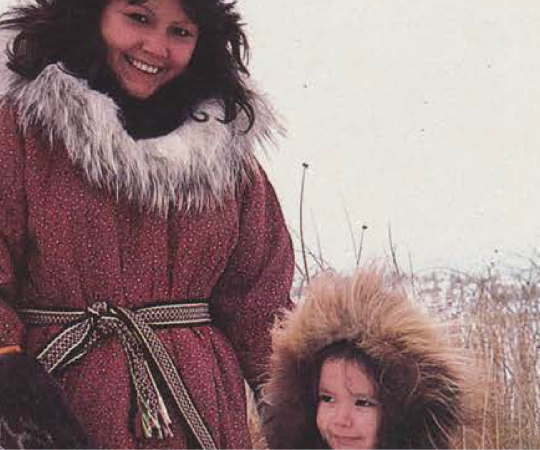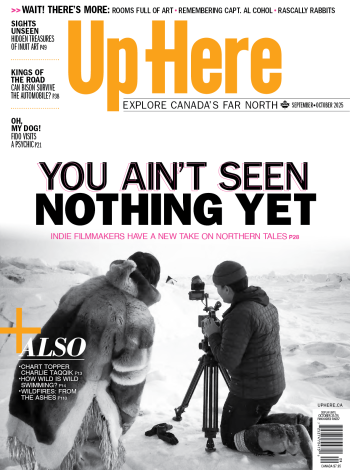For two weeks during springtime, every night around seven, Frederick Beaulieu’s white Windstar winds its way through the back alley dumpsters of Hay River’s Boardroom restaurant, crosses a small creek and careens into a stand of birch trees on the other side. Beaulieu’s got 40 trees tapped in this tiny wedge of forest. Going by anybody’s word, he’s the last of the Métis birch tree tappers, and that means he can tap just about anywhere he wants.
Beaulieu might not have fallen so deeply in love with the burnt-molasses taste of birch syrup if he hadn’t, he says, “been born without skin.” Growing up in a one-room cabin near Fort Resolution, his childhood eczema was so bad—he demonstrates how he could pull the sheaths of his fingertips off like thimbles every morning—his parents kept him essentially bedridden; the risk of infection was simply too high. So while his brothers and sisters learned moose hunting and beaver trapping and, later on, left for residential school in Fort Simpson, Beaulieu stayed close to the cabin. As one of his chores, he delivered firewood to the families nearby, and in payment, the ladies of the bush would feed him a plate of warm bannock drizzled with birch syrup. In the spring, it would come ladled out from a cast iron cauldron swinging over a fire, still smoking and frothing with whipped golden foam.
Beaulieu empties about six brimming half-gallon pails into two mayonnaise vats pulled from the back of the van, then strains out the early-season flies, decanting that into a five-gallon water jug. The sap’s just barely thawed it’s so early in the season. It starts to snow. With each batch of pails unloaded from the trees, Beaulieu drives the van deeper into the birch, the raspberry bushes and underbrush scraping shriller against the doors and windshield as he goes.
He skips ahead in his story, past the part where he dreamt that he killed his eczema and it mysteriously cleared; how he learned to read, write and speak English in his late teens and got his steam engineer’s certificate. He says, “I was working for the government and I was drinking too much. Getting hired and fired and hired and fired. So my cousin said, ‘Let’s go out in the bush for the spring hunt. Go out on ski-doos and come back in a boat.’”
Of course, Beaulieu didn’t know how to hunt, so he spent most of his days back at the cabin. “Reminded me of that birch syrup,” he says. “I heard so much about how it was made—you just boil it—but no one around made it anymore, so I tried it myself. I made one cup and man it was nice. Perfect. Next day I made another cup and it was good. Third day I put a cup on the fire and when I came back all I could smell was toe jam. It was coming from the pot!” He cooled it off and tasted it—“Now I know what toe jam tastes like.” He carried it back to town with him and brought it to the elders. Laughing, they said he’d harvested too late—when the buds come out, the syrup rots. “But boy, oh boy, were they happy to see that syrup,” he says, even if it was rotten.
Thirty-four springs later, Beaulieu’s harvested birch syrup near Fort Smith, Fort Resolution and Hay River, where he lives now. At his most productive, he tapped about 400 trees, travelling 160 km, round trip every day, to a large stand close to the Alberta border. He’s registered as the Thumper Creek Birch Syrup Company, but he does his accounting by his losses for each bottle, not profits. “Can’t really sell it anyways,” he shrugs. “It doesn’t work that way. You gotta give it away.”
Beaulieu lowers his pageboy cap and scans his diminutive birch stand. At 75, even with volunteers who cleared a path through Thumper Creek every year, he had to downsize. Last year, he asked the Hay River town council to let him tap in town. He boils the whole batch over four fires in a backyard littered with white vans.
“People don’t [tap] much anymore ‘cause it’s time-consuming,” he says. The light snow has become a full-fledged blizzard. It obscures the Boardroom and the highway. It’s just trees and the pails swinging on the taps. Beaulieu takes a deep breath, as if he’s a hundred miles away. “I just love it,” he says. “I’m out in the bush.”










